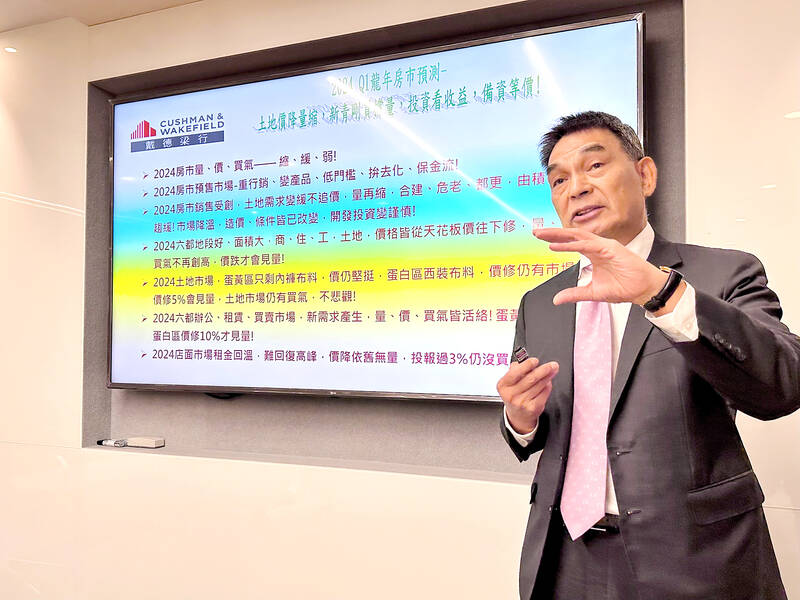Taiwan’s property market might face transaction and price corrections this year, with commercial and residential properties, as well as land affected, as soaring prices limit buying interest, Cushman & Wakefield Taiwan said yesterday.
“House prices per unit hit a record last year because developers rolled out small apartments to make them appear relatively affordable,” Cushman & Wakefield Taiwan managing director Billy Yen (顏炳立) told a news conference in Taipei.
The trend indicated that in addition to location and environment considerations, affordability is crucial to facilitate sales and further price hikes would drive away potential buyers, Yen said.

Photo: Hsu Yi-ping, Taipei Times
People who disagree could put houses they purchased in the past two years on the market and see if they can find buyers willing to pay similar prices, he said.
The buying spree induced by favorable lending terms for first-home purchases would prove transient this year in the absence of price concessions, he said.
Market players have sought to project a general sense of euphoria that runs counter to reality, he said, adding that transaction data last year support his observations.
Land deals last year plunged 34 percent from 2022 to NT$112.9 billion (US$3.64 billion), while commercial property transactions rose mildly to NT$130.19 billion, Cushman & Wakefield Taiwan said.
The small increase in commercial property trading had a lot to do with the liquidation of the Shin Kong No. 1 REIT fund (新光一號), which sold its six buildings in Taipei for a combined NT$30.7 billion, Cushman & Wakefield Taiwan valuation and advisory services head Charlie Yang (楊長達) said.
There are no REIT fund liquidity attempts on the horizon, which would weigh on transactions this year, Yang said.
It remains to be seen if domestic life insurers would rejoin the market after remaining on the sidelines last year due to stiffer yield requirements amid monetary tightening, he said.
That left self-occupancy needs from corporations to underpin the commercial property market, he said.
Another concern is that urban renewal projects and joint ventures could slow this year as developers turn cautious to cope with mounting construction costs and unfavorable investment terms, Yen said.
The market for land could fare better on the back of solid demand if sellers lower prices by 5 percent, he said.
Spiking prices for industrial plots of land last year put pressure on corporate profit, fueling caution on the part of prospective buyers, the company said.

POWERING UP: PSUs for AI servers made up about 50% of Delta’s total server PSU revenue during the first three quarters of last year, the company said Power supply and electronic components maker Delta Electronics Inc (台達電) reported record-high revenue of NT$161.61 billion (US$5.11 billion) for last quarter and said it remains positive about this quarter. Last quarter’s figure was up 7.6 percent from the previous quarter and 41.51 percent higher than a year earlier, and largely in line with Yuanta Securities Investment Consulting Co’s (元大投顧) forecast of NT$160 billion. Delta’s annual revenue last year rose 31.76 percent year-on-year to NT$554.89 billion, also a record high for the company. Its strong performance reflected continued demand for high-performance power solutions and advanced liquid-cooling products used in artificial intelligence (AI) data centers,

SIZE MATTERS: TSMC started phasing out 8-inch wafer production last year, while Samsung is more aggressively retiring 8-inch capacity, TrendForce said Chipmakers are expected to raise prices of 8-inch wafers by up to 20 percent this year on concern over supply constraints as major contract chipmakers Taiwan Semiconductor Manufacturing Co (TSMC, 台積電) and Samsung Electronics Co gradually retire less advanced wafer capacity, TrendForce Corp (集邦科技) said yesterday. It is the first significant across-the-board price hike since a global semiconductor correction in 2023, the Taipei-based market researcher said in a report. Global 8-inch wafer capacity slid 0.3 percent year-on-year last year, although 8-inch wafer prices still hovered at relatively stable levels throughout the year, TrendForce said. The downward trend is expected to continue this year,

Vincent Wei led fellow Singaporean farmers around an empty Malaysian plot, laying out plans for a greenhouse and rows of leafy vegetables. What he pitched was not just space for crops, but a lifeline for growers struggling to make ends meet in a city-state with high prices and little vacant land. The future agriculture hub is part of a joint special economic zone launched last year by the two neighbors, expected to cost US$123 million and produce 10,000 tonnes of fresh produce annually. It is attracting Singaporean farmers with promises of cheaper land, labor and energy just over the border.

US actor Matthew McConaughey has filed recordings of his image and voice with US patent authorities to protect them from unauthorized usage by artificial intelligence (AI) platforms, a representative said earlier this week. Several video clips and audio recordings were registered by the commercial arm of the Just Keep Livin’ Foundation, a non-profit created by the Oscar-winning actor and his wife, Camila, according to the US Patent and Trademark Office database. Many artists are increasingly concerned about the uncontrolled use of their image via generative AI since the rollout of ChatGPT and other AI-powered tools. Several US states have adopted